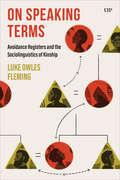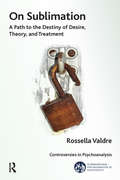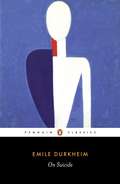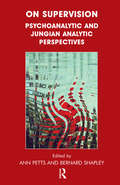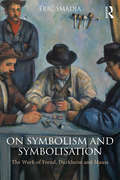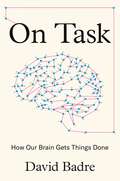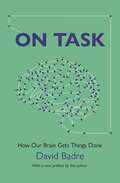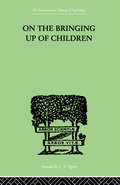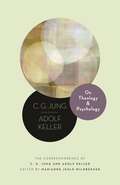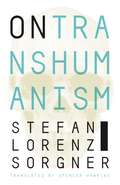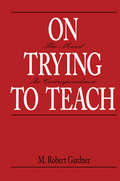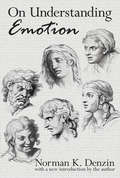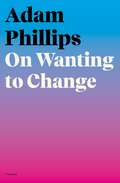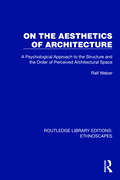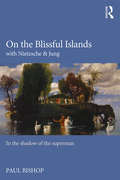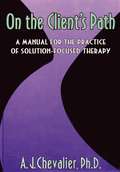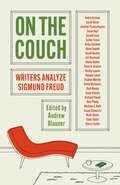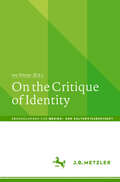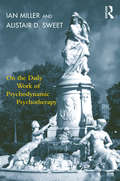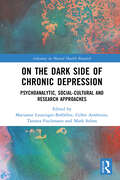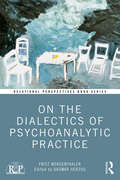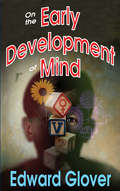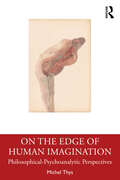- Table View
- List View
On Speaking Terms: Avoidance Registers and the Sociolinguistics of Kinship (Studies in the Anthropology of Language, Sign, and Social Life)
by Luke FlemingWhy are kin, in societies all over the world, divided into “joking” and “avoidance” relations? Foundational figures in the human sciences, from E.B. Tylor and Alfred Radcliffe-Brown to Sigmund Freud and Claude Lévi-Strauss, have sought to explain why some classes of kin are normatively expected to prank and tease one another while others must studiously avoid each other’s presence. In this extensively researched comparative study, linguistic anthropologist Luke Owles Fleming offers a bold new answer to this problem. With a particular focus on avoidance relationships, On Speaking Terms argues that in order to understand cross-cultural convergences in the patterning of kinship-keyed comportments, we must attend to the sociolinguistic codes through which kinship relationships are enacted. Drawing on ethnographic data from more than one hundred different societies, the book documents and analyses parallels in the linguistic and non-verbal signs through which avoidance relationships are experientially realized. With dedicated discussions of Aboriginal Australian “mother-in-law languages,” name and word tabooing practices, pronominal honorification, and non-verbal strategies of interactional and sensorial avoidance, it reveals recurrent sociolinguistic patterns attested in kinship avoidance. In demonstrating the vital role of sociolinguistic codes for transforming kinship categories into phenomenologically rich relationships, On Speaking Terms makes an important contribution to the anthropology of kinship.
On Sublimation: A Path to the Destiny of Desire, Theory, and Treatment (The International Psychoanalytical Association Controversies in Psychoanalysis Series)
by Rossella ValdreThis book explores and revisits the concept of sublimation, in its various aspects and implications that it has in theory and clinical psychoanalysis, and also in its broader socio-cultural aspects. The basic assumption that aroused the author's interest in the topic is a certain surprise in observing how sublimation in psychoanalysis is in general spoken about less in contemporary discourse: so is it an outdated concept, an endangered species? Does it belong to the archaeology of psychotherapy? Or, on the contrary, is it so much a part of analytical practice and so well established and implicit in theory that it is not necessary to discuss it any more? It is the prevailing opinion of the author that sublimation is nowadays expressed differently and has undergone a sort of anthropological mutation, as has happened to several Freudian concepts with the changing historical and cultural contexts.
On Suicide
by Emile DurkheimEmile Durkheim's On Suicide (1897) was a groundbreaking book in the field of sociology. Traditionally, suicide was thought to be a matter of purely individual despair but Durkheim recognized that the phenomenon had a social dimension. He believed that if anything can explain how individuals relate to society, then it is suicide: Why does it happen? What goes wrong? Why do certain social, religious or racial groups have higher incidences of suicide than others? As Durkheim explored these questions he became convinced that abnormally high or low levels of social integration lead to an increased likelihood of suicide. On Suicide was the result of his extensive research. Divided into three parts - individual reasons for suicide, social forms of suicide and the relation of suicide to society as a whole - Durkheim's revelations have fascinated, challenged and informed readers for over a century.
On Supervision: Psychoanalytic and Jungian Analytic Perspectives
by Ann Petts Bernard ShapleyThis book comprises papers on the theory and practice of supervision, all written by experienced psychoanalytic psychotherapists and Jungian analytic psychotherapists. Important aspects of the supervisory relationship are covered, including papers on the supervisor's countertransference, supervising work with suicidal patients and the dynamics of racial difference in supervision, and group supervision and dynamics related to the supervisor's role in the assessment of trainees.The contributions in this book mainly began life as presentations to the BAP course on 'Developing Supervision Skills', a space in which new thinking about supervision has been able to be developed by contributors and participants alike. The book also covers fundamentals to consider when beginning in supervisory practice, including ways of creating a secure frame for thinking to take place and some of the ethical attitudes needed within the supervisory relationship. Supervisory technique is considered in broad overview and in some very personal views, from two highly experienced supervisors and a supervisee who has keenly observed some different supervisory styles.
On Symbolism and Symbolisation: The Work of Freud, Durkheim and Mauss
by Éric SmadjaIn On Symbolism and Symbolisation: The Work of Freud, Durkheim and Mauss, Éric Smadja returns to the end of the 19th century and explores how the concepts of symbolism and symbolisation have been discussed among theorists, and how this discussion has developed and revolutionised the human sciences as we know them today. Uniquely, he connects three key thinkers of psychoanalysis, sociology and ethnology – Freud, Durkheim and Mauss – and discusses how their diverse epistemological paths blend and have consequently shaped our representation of humanity, society and culture in the 20th and 21st centuries. In this innovative work, Smadja provides a complete biographical journey of these three influential founders, beginning with a dedicated chapter on Freud, followed by Durkheim and then Mauss. He explains each of their revolutionary creations – Freud’s psychoanalysis, Durkheim’s French school of sociology and Mauss’s modern French ethnology – before exploring their ground-breaking, yet differing, conceptions of symbolism and symbolisation, offering a discussion of specific and common aspects detected between these conceptions. In his conclusions, Smadja focusses on France to examine what became of their thoughts after the second half of the 20th century. He inspects the fields of French anthropology, sociology and psychoanalysis: Lévi-Strauss and his structuralist revolution, his colleagues Françoise Héritier and Maurice Godelier, Pierre Bourdieu, who was an ethnologist before becoming a sociologist, and, of course, Lacan. On Symbolism and Symbolisation: The Work of Freud, Durkheim and Mauss is a pioneering work that will appeal to psychoanalysts in practice and in training, and to academics and students of psychology, anthropology, sociology, philosophy and the history of ideas. It will also be of interest to anyone wanting to learn more about the life and work of these three major theorists and the connections between the human and social sciences.
On Task: How Our Brain Gets Things Done
by David BadreA look at the extraordinary ways the brain turns thoughts into actions—and how this shapes our everyday livesWhy is it hard to text and drive at the same time? How do you resist eating that extra piece of cake? Why does staring at a tax form feel mentally exhausting? Why can your child expertly fix the computer and yet still forget to put on a coat? From making a cup of coffee to buying a house to changing the world around them, humans are uniquely able to execute necessary actions. How do we do it? Or in other words, how do our brains get things done? In On Task, cognitive neuroscientist David Badre presents the first authoritative introduction to the neuroscience of cognitive control—the remarkable ways that our brains devise sophisticated actions to achieve our goals. We barely notice this routine part of our lives. Yet, cognitive control, also known as executive function, is an astonishing phenomenon that has a profound impact on our well-being.Drawing on cutting-edge research, vivid clinical case studies, and examples from daily life, Badre sheds light on the evolution and inner workings of cognitive control. He examines issues from multitasking and willpower to habitual errors and bad decision making, as well as what happens as our brains develop in childhood and change as we age—and what happens when cognitive control breaks down. Ultimately, Badre shows that cognitive control affects just about everything we do.A revelatory look at how billions of neurons collectively translate abstract ideas into concrete plans, On Task offers an eye-opening investigation into the brain’s critical role in human behavior.
On Task: How Our Brain Gets Things Done
by David BadreA look at the extraordinary ways the brain turns thoughts into actions—and how this shapes our everyday livesWhy is it hard to text and drive at the same time? How do you resist eating that extra piece of cake? Why does staring at a tax form feel mentally exhausting? Why can your child expertly fix the computer and yet still forget to put on a coat? From making a cup of coffee to buying a house to changing the world around them, humans are uniquely able to execute necessary actions. How do we do it? Or in other words, how do our brains get things done? In On Task, cognitive neuroscientist David Badre presents the first authoritative introduction to the neuroscience of cognitive control—the remarkable ways that our brains devise sophisticated actions to achieve our goals. We barely notice this routine part of our lives. Yet, cognitive control, also known as executive function, is an astonishing phenomenon that has a profound impact on our well-being.Drawing on cutting-edge research, vivid clinical case studies, and examples from daily life, Badre sheds light on the evolution and inner workings of cognitive control. He examines issues from multitasking and willpower to habitual errors and bad decision making, as well as what happens as our brains develop in childhood and change as we age—and what happens when cognitive control breaks down. Ultimately, Badre shows that cognitive control affects just about everything we do.A revelatory look at how billions of neurons collectively translate abstract ideas into concrete plans, On Task offers an eye-opening investigation into the brain’s critical role in human behavior.
On The Bringing Up Of Children (International Library Of Psychology Ser.)
by Rickman, JohnFirst Published in 1999. Routledge is an imprint of Taylor & Francis, an informa company.
On Theology and Psychology: The Correspondence of C. G. Jung and Adolf Keller (Philemon Foundation Series #19)
by C. G. Jung Adolf KellerJung's correspondence with one of the twentieth century's leading theologians and ecumenicistsOn Theology and Psychology brings together C. G. Jung's correspondence with Adolf Keller, a celebrated Protestant theologian who was one of the pioneers of the modern ecumenical movement and one of the first religious leaders to become interested in analytical psychology. Their relationship spanned half a century, and for many years Keller was the only major religious leader to align himself with Jung and his ideas. Both men shared a lifelong engagement with questions of faith, and each grappled with God in his own distinctive way.Presented here in English for the first time are letters that provide a rare look at Jung in dialogue with a theologian. Spanning some fifty years, these letters reveal an extended intellectual and spiritual discourse between two very different men as they exchange views on the nature of the divine, the compatibility of Jungian psychology and Christianity, the interpretation of the Bible and figures such as Jesus and Job, and the phenomenon of National Socialism. Although Keller was powerfully attracted to Jung's ideas, his correspondence with the famed psychiatrist demonstrates that he avoided discipleship. Both men struggled with essential questions about human existence, spirituality, and well-being, and both sought common ground where the concerns of psychologists and theologians converge.Featuring an illuminating introduction by Marianne Jehle-Wildberger, On Theology and Psychology offers incomparable insights into the development of Jung's views on theology and religion, and a unique window into a spiritual and intellectual friendship unlike any other.
On Transhumanism
by Stefan Lorenz SorgnerTranshumanism is widely misunderstood, in part because the media have exaggerated current technologies and branded the movement as dangerous, leading many to believe that hybrid humans may soon walk among us and that immortality, achieved by means of mind-uploading, is imminent. In this essential and clarifying volume, Stefan Lorenz Sorgner debunks widespread myths about transhumanism and tackles the most pressing ethical issues in the debate over technologically assisted human enhancement.On Transhumanism is a vital primer on the subject, written by a world-renowned expert. In this book, Sorgner presents an overview of the movement’s history, capably summarizing the twelve pillars of transhumanist discourse and explaining the great diversity of transhumanist responses to each individual topic. He highlights the urgent ethical challenges related to the latest technological developments, inventions, and innovations and compares the unique cultural standing of transhumanism to other cultural movements, placing it within the broader context of the Enlightenment, modernity, postmodernity, and the philosophical writings of Nietzsche. Engagingly written and translated and featuring an introduction for North American readers, this comprehensive overview of the cultural and philosophical movement of transhumanism will be required reading for students of posthumanist philosophy and for general audiences interested in learning about the transhumanist movement.
On Transhumanism
by Stefan Lorenz SorgnerTranshumanism is widely misunderstood, in part because the media have exaggerated current technologies and branded the movement as dangerous, leading many to believe that hybrid humans may soon walk among us and that immortality, achieved by means of mind-uploading, is imminent. In this essential and clarifying volume, Stefan Lorenz Sorgner debunks widespread myths about transhumanism and tackles the most pressing ethical issues in the debate over technologically assisted human enhancement.On Transhumanism is a vital primer on the subject, written by a world-renowned expert. In this book, Sorgner presents an overview of the movement’s history, capably summarizing the twelve pillars of transhumanist discourse and explaining the great diversity of transhumanist responses to each individual topic. He highlights the urgent ethical challenges related to the latest technological developments, inventions, and innovations and compares the unique cultural standing of transhumanism to other cultural movements, placing it within the broader context of the Enlightenment, modernity, postmodernity, and the philosophical writings of Nietzsche. Engagingly written and translated and featuring an introduction for North American readers, this comprehensive overview of the cultural and philosophical movement of transhumanism will be required reading for students of posthumanist philosophy and for general audiences interested in learning about the transhumanist movement.
On Transitions From Group Care: Homeward Bound
by D Patrick Zimmerman Richard A. Epstein JrExamine ways to help prepare young people for a successful transition from group care to community living! How can we best help young people in residential care settings prepare for life "on the outside?" The editors of On Transitions From Group Care: Homeward Bound are devoted to helping answer the question of how providers of residential treatment services can improve the transition process when children in their care are transferred to less restrictive situations. Chapters focus on the challenges of this process when working with sexually aggressive youth, adolescents with behavioral or conduct disorders, and the families of young people in residential care facilities. You'll learn about model transitional living programs, ways to integrate family work into residential care, and programs that focus on social/life-skills training. On Transitions From Group Care: Homeward Bound examines: a program designed to involve parents and caregivers in the residential treatment and transition process for sexually aggressive youth diagnosis and placement variables that affect outcomes for adolescents with behavior disorders in an outpatient mental health clinic the redesigning of an existing residential treatment program to allow parents, caregivers, and the community a much more integral role in each child's residential treatment experience case studies of children who have participated in the transitional living program at Bellefaire/JCB-a large social service agency for children and families in the Cleveland, Ohio area-with both successful and unsuccessful outcomes the role of social skills training programs in facilitating successful transitions from residential treatment to community life
On Trying To Teach: The Mind in Correspondence
by M. Robert GardnerIn an era in which the teaching enterprise is freighted with tactics, techniques, and methods, M. Robert Gardner guides us back to the spirit of teaching. He writes especially about the dilemmas and challenges of teaching, about how it feels to be trying to teach. Gardner's provocative, often iconoclastic musings will goad teachers of all subjects to reflect anew on their calling. Clinical readers will take special pleasure in the humane psychoanalytic sensibility that not only infuses Gardner's own teaching, but shapes his approach to the most basic questions about teaching and learning in general.
On Understanding Emotion
by Melvin J. LaskyEmotions--fleeting, insubstantial, changeable, and ambiguous--seem to defy study and analysis. Nothing is more complex, mysterious, and subject to conflicting theories and interpretations than human emotion. Yet the central importance of emotion in human affairs is undeniable. Emotions affect all levels of life--personal, organizational, political, cultural, economic, and religious. Emotions give meaning to life. Emotional disturbances can destroy that meaning.How should emotions be studied? How can an understanding of the inner feelings of individuals illuminate important social interactions and human developments? In his book, Norman Denzin presents a systematic, in-depth analysis of emotion that combines new theoretical advances with practical applications. Based on an intensive, critical examination of classical and modern theoretical research--and on revealing personal interviews in which ordinary people express their emotional lives--he builds a new framework for understanding ordinary emotions and emotional disturbances.Denzin analyzes how people experience joy and pain, love and hate, anger and despair, friendship and alienation--and examines the personal, psychological, social, and cultural aspects of human emotion to provide new perspectives for understanding human experience and social interactions. He offers new insights on the role of emotions in family violence and recommends ways of helping people escape from recurring patterns of violence. And in criticizing current conceptions of emotionally disturbed people, he reveals the nature of their inner lives and the ways they perceive and relate to others. In sum, this book presents new insights on human relationships and human experience. It is now available in paperback for the first time, with a new introduction by the author.
On Wanting to Change
by Adam PhillipsFrom the UK’s foremost literary psychoanalyst, a dazzling new book on the universal urge to change our lives.We live in a world in which we are invited to change—to become our best selves through politics, or fitness, or diet, or therapy. We change all the time—growing older and older—and how we think about change changes over time too.We want to think of our lives as progress myths—as narratives of positive personal growth—at the same time as we inevitably age and suffer setbacks.Adam Phillips’s sparkling book On Wanting to Change explores the stories we tell about change, and the changes we actually make—and the fact that they don’t always go, or come, together.
On the Aesthetics of Architecture: A Psychological Approach to the Structure and the Order of Perceived Architectural Space (Routledge Library Editions: Ethnoscapes)
by Ralf WeberOriginally published in 1995 as part of the Ethnoscapes: Current Challenges in the Environmental Social Sciences series, reissued now with a new series introduction, On the Aesthetics of Architecture is a result of an interdisciplinary study in architectural theory, psychology and philosophy and the author’s experience as a practicing architect. It tries to relate theories of aesthetics and recent advances in the psychology of visual perception to the practice of design.The text starts with an analysis of traditional and contemporary schools of thought in architectural theory, and then proceeds through the formulation of a general theory of aesthetics based on perceptual and cognitive information processing to a description of the actual conditions under which aesthetic experiences of buildings and cities take place. It exemplifies principles of aesthetic appropriateness through an analysis of architectural space and form.Weber’s book attempts to move the discussion of architectural aesthetics beyond the shifting doctrines of style and the often ambiguous dicta of critics. While the author makes no claim that his interpretation of psychological research will result in good architecture, he does insist on the need to bring the discussion of form back to more objective grounds. As such, it provided a valuable teaching resource and an important new contribution to the discussion among architects themselves, as well as between psychologists, philosophers and art theorists at the time.
On the Blissful Islands with Nietzsche & Jung: In the shadow of the superman
by Paul BishopWhat are the blissful islands? And where are they? This book takes as its starting-point the chapter called ‘On the Blissful Islands’ in Part Two of Nietzsche’s Thus Spoke Zarathustra, and its enigmatic conclusion: ‘The beauty of the Superman came to me as a shadow’. From this remarkable and powerful passage, it disengages the Nietzschean idea of the Superman and the Jungian notion of the shadow, moving these concepts into a new, interdisciplinary direction. In particular, On the Blissful Islands seeks to develop the kind of interpretative approach that Jung himself employed. Its chief topics are classical (the motif of the blissful islands), psychological (the shadow), and philosophical (the Übermensch or superman), blended together to produce a rich, intellectual-historical discussion. By bringing context and depth to a nexus of highly problematic concepts, it offers something new to the specialist and the general reader alike. So this book considers the significance of the statue in the culture of antiquity (and in alchemy), and investigates the associated notion of self-sculpting as a form of existential exercise. This Neoplatonic theme is pursued in relation to a poem by Schiller, at the centre of which lies the notion of self-sculpting, thus highlighting Nietzsche’s (and Jung’s) relationship to Idealism. Its conclusion directly addresses the vexed (and controversial) question of Nietzsche’s relation to Plato. This book’s main ambition is to provide a cross-cultural, interdisciplinary reading of key themes and motifs, using Jungian ideas in general (and Jung’s vast seminar on Zarathustra in particular) to uncover a dimension of deep meaning in key passages in Nietzsche. Engaging the reader directly on major existential questions, it aims to be an original, thought-provoking contribution to the history of ideas, and to show that Zarathustra was right: There still are blissful islands! This book will be stimulating reading for analytical psychologists, including those in training, and academics and scholars of Jungian studies, Nietzsche, and the history of ideas.
On the Client's Path: A Manual for the Practice of Brief Solution-focused Therapy
by A. J. ChevalierAccording to the solution-focused model, the answer to a client's problem will ultimately come from the client's own repertoire of coping strategies. On the Client's Path provides everything you need in terms of theory and the step-by-step components of the solution-focused process. It shows how this therapy can be applied to a variety of clients in a range of clinical and medical settings. Additional chapters cover worst-case scenarios and crisis situations. Numerous case notes offer client-therapist dialogues drawn from a broad range of case histories.
On the Couch: Writers Analyze Sigmund Freud
by Andrew BlaunerA collection of colorful and candid essays and other pieces about Freud and his legacy today, featuring twenty-five leading writersWith original contributions by André Aciman • Sarah Boxer • Jennifer Finney Boylan • Susie Boyt • Gerald Early • Esther Freud • Rivka Galchen • Adam Gopnik • David Gordon • Siri Hustvedt • Sheila Kohler • Peter D. Kramer • Phillip Lopate • Thomas Lynch • Daphne Merkin • David Michaelis • Rick Moody • Susie Orbach • Richard Panek • Alex Pheby • Michael S. Roth • Casey Schwartz • Mark Solms • Colm Tóibín • Sherry TurkleW. H. Auden described Sigmund Freud (1856–1939) as &“a whole climate of opinion / Under whom we conduct our differing lives.&” The controversial father of psychiatry and psychoanalysis, Freud charted the human unconscious, brought us the talking cure, and wrote books that now rank among the classics of world literature. In On the Couch, the great analyst is analyzed by some of today&’s great writers and thinkers, who help us understand the man who has helped us understand ourselves as much, if not more, than anyone else, ever. The result is a fresh, multifaceted reassessment of Freud&’s continuing relevance and influence on ideas, literature, culture, science, and more.Here, Colm Tóibín writes about Freud, World War I, Henry James, and Thomas Mann; Adam Gopnik explores Freud&’s Civilization and Its Discontents; Susie Orbach considers Freud&’s &“ordinary unhappiness&” and D. W. Winnicott&’s &“good enough&”; Jennifer Finney Boylan reflects on penis envy and gender identity; Peter Kramer describes how new science and drugs have revolutionized psychology since Freud; Susie Boyt, one of Freud&’s great-granddaughters, spends the night at the Freud Museum in London; Siri Hustvedt examines Freud&’s divided reception today; and there&’s much more.Filled with insights, provocation, and humor, On the Couch offers an original and nuanced portrait of Freud as a complex figure who, for all his flaws, forever changed how we see ourselves and the world.
On the Critique of Identity (Abhandlungen zur Medien- und Kulturwissenschaft)
by Ivo RitzerWith the rise of ‘identity politics’ both in right-wing extremism as well as in activist academia, arts and feuilleton, major differences between the traditional left and the right have become blurred. This book addresses the ideological shifts from a vantage point of critical theory, psychoanalysis, as well as Marxist interventions. Discussed are prevailing ideologies of identitarianism, putting the latter into social and historical, as well as philosophical and epistemological context. The chapters offer theoretical elaborations on the myriad connections of identitarianism and counter-enlightenment, analyzing in particular the role of ethnocentric populism, antisemitism, as well as conformist and conservative rebellion.
On the Daily Work of Psychodynamic Psychotherapy
by Ian Miller Alistair D. SweetOn the Daily Work of Psychodynamic Psychotherapy is an operating manual for the challenging, often lonely and confusing work of doing therapy. It locates clinical method in a historical tradition of many contributory workers including Freud, Breuer, Klein, Segal, Ferenczi, Waelder, Katan, Tausk, Sullivan, Lacan, Bion, and Ogden. In this way, the book links clinicians with psychoanalytic thinkers across the foreclosures of scholastic orientation and politics, to arrive at a methodology, based in interpretive reflection, and demonstrably active from the period of psychoanalytic origins as an application of the influence of mind upon mind. The authors provide the reader with a methodology of clinical thinking, of how clinicians orient themselves in clinical registration, moment by moment. It develops a route of fundamental therapeutic action, applicable under all clinical situations, from the single session consultation to intensive, long-term psychoanalytic psychotherapy.
On the Dark Side of Chronic Depression: Psychoanalytic, Social-cultural and Research Approaches (Advances in Mental Health Research)
by Mark Solms Tamara Fischmann Marianne Leuzinger-Bohleber Gilles AmbresinThis book brings together cutting-edge expertise from psychoanalysis, psychiatry, neuroscience and social science to shed light on the dark side of chronic depression. Considering different forms of depression on a continuum, the book develops new diagnostical considerations on depression. It includes detailed case studies from clinical psychoanalytical practice, conceptual considerations and historical analyses to current empirical and neurobiological studies on depression. The book is unique in bridging a gap between Anglo-Saxon/German psychoanalysis and French traditions in relation to clinical treatment techniques and conceptualizations of depression and trauma. Chapters present new research on the social, biographical, genetic and neurobiological determinants of severe depressive disorder and explore how these can be differentiated and expanded in the face of new cultural realities as well of new findings particularly in modern neurosciences. The book explores new understanding and discussion of treatment options for depression and will be essential reading for researchers and students in the field of depression and mental health research. It will also enrich the conceptual and clinical knowledge of psychoanalysts and psychotherapy researchers and students.
On the Dialectics of Psychoanalytic Practice (Relational Perspectives Book Series)
by Fritz MorgenthalerFritz Morgenthaler was a crucial figure in the return of psychoanalysis to post-Nazi Central Europe. An inspiring clinician and teacher to the New Left generation of 1968, he was the first European psychoanalyst since Freud to declare that homosexuality is not, indeed never, a pathology, and in Technik, developed revolutionary ideas for transforming clinical technique. On the Dialectics of Psychoanalytic Practice offers the first publication in English of this psychoanalytic, counterculture classic. Those who first picked up Technik encountered it at a historical moment when Marxist psychoanalyst Wilhelm Reich, popular New Left cultural critic Klaus Theweleit, and the texts of the Frankfurt School were already required reading. While not a political text in the same direct way, Morgenthaler’s Technik nonetheless shared many of their preoccupations and conclusions about human nature. It was read as technical guidance for psychoanalysts, but also as a manifesto dedicated to the problem of how it might be possible genuinely to live a postfascist, and nonfascist, existence. Morgenthaler was a protorelationalist who recombined the traditions of ego and self psychology as he retained a commitment to drive theory. Here Dagmar Herzog makes his work available to a new generation of analysts, providing essential source material, annotations, and groundbreaking analysis of the continued importance of the work for historians and therapeutic practitioners alike. On the Dialectics of Psychoanalytic Practice will interest practicing clinicians as well as intellectual historians and cultural studies scholars seeking to understand the return of psychoanalysis to post-Nazi Central Europe.
On the Early Development of Mind: Selected Papers On Psychoanalysis
by Edward GloverOn the Early Development of Mind by Edward Glover covers a period of thirty years in which he gathered together and annotated his various contributions to this most obscure of all psychoanalytical themes. He approaches mind from various angles, in particular the vicissitudes of the libido, of ego-formation, and of the emotions. The work is offered in chronological order and with unabashed changes to enhance readability.His clinical studies are orientated from the same angles and he deals, inter alia, with the developmental aspects of normal and disordered character, alcoholism, drug addiction, perversions, obsessional neuroses, and psychoses. Of out standing significance are his papers on the psychoanalytical classification of mental disorders, on the nature of reality sense, and on the 'functional' aspects of the mental apparatus.Glover was well aware of the dangers of uncontrolled, abstract theorizing, and several of his later essays exhibit an unflinching resolution to apply the strictest scientific standards not only in the regulation of research and the control of technique, but also in the teaching and the training of psychoanalysts. The book represents a remarkable achievement indispensable to the psychoanalytical student, the psychiatrist, and all who wish to ground themselves in the principles and history of psychoanalysis.
On the Edge of Human Imagination: Philosophical-Psychoanalytic Perspectives
by Michel ThysIn this fascinating book, Michel Thys explores the limitations of human imagination and symbolization, showing the potentially destructive result of a mind that cannot confront reality. His wide-ranging research takes us into the domain of the unimaginable, unthinkable and unspeakable.Divided into four parts, On the Edge of Human Imagination sees Thys adopt a phenomenological perspective to move through experiences encountered in the analyst’s room, from depression and psychosis to PTSD. Through a dialogue with philosophers such as Jean-Paul Sartre, Maurice Blanchot and Emmanuel Levinas, Thys investigates the relationship between fascination, identification, socio-cultural phenomena and aesthetic pleasure. Throughout, he uses the paintings of Edward Hopper, Sophocles’ Antigone, Mary Shelley’s Frankenstein, Franz Kafka’s Metamorphosis and Charlie Chaplin’s Modern Times to support his ideas. Integrating Freudian, Kleinian and Bionian theories, he shows the psychic impact of humanity’s attempt to balance fear and passion on the edge of the imaginable and the liminality of the search for meaning. The book brings together psychoanalytic theory and practice and philosophical anthropology, confronting, in the end, Freud’s ideas of the death drive with Sartre’s understanding of the desire for being as the main driving force in human existence.This book offers an illuminating evaluation of what it means to be human, making it an important read for psychoanalysts, psychologists and psychotherapists, as well as philosophers interested in the intersection between psychoanalytic, philosophical and phenomenological thought.
